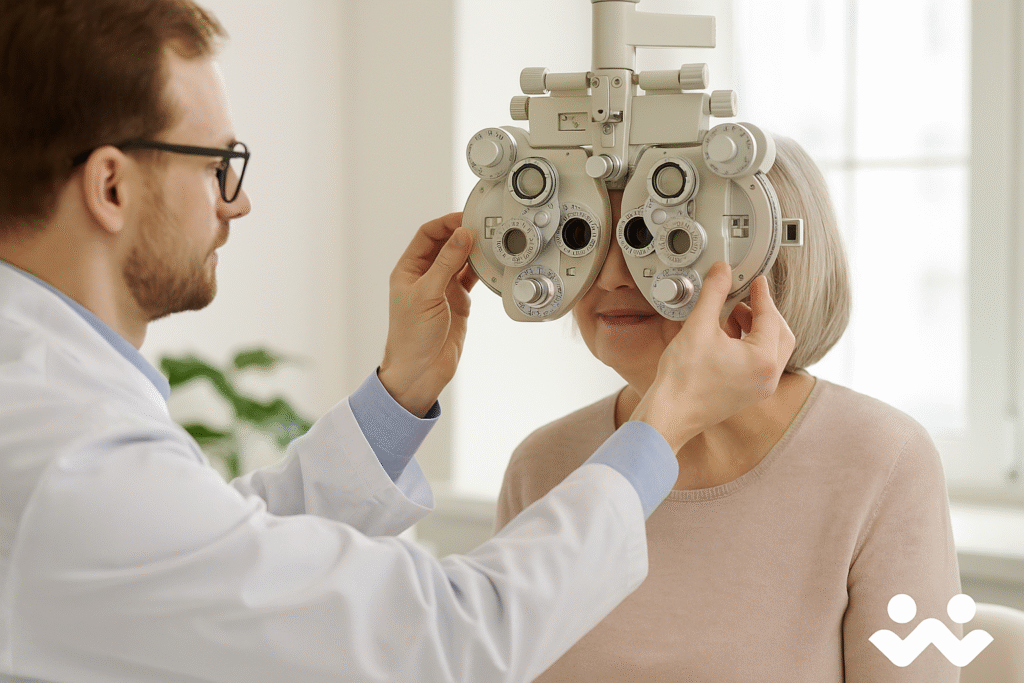Why Eye Health Deserves Attention
For adults over 60, clear vision means more than just seeing well — it’s about staying independent, safe, and connected to the world. Yet, many people accept vision decline as “just part of getting older.” In truth, most age-related eye conditions can be managed, treated, or even prevented with the right care.
Blurry text, glare from headlights, or colors that seem less vivid may all be early signs of changes in the eyes. Recognizing these small shifts early gives doctors time to protect your sight before permanent loss occurs.
Common Eye Conditions After 60
While everyone’s vision changes differently, a few eye conditions are especially common in later life. Understanding them helps seniors and caregivers know what to watch for and when to seek help.
Cataracts cause cloudy or blurred vision as the eye’s lens becomes less transparent. They develop slowly and can make lights seem too bright or colors appear faded. Modern cataract surgery is one of the safest, most successful medical procedures available, restoring clear vision for millions each year.
Glaucoma damages the optic nerve due to increased eye pressure. It often starts without noticeable symptoms, gradually narrowing side vision. Regular eye exams are critical because early detection can prevent blindness through medication or laser treatment.
Age-related macular degeneration (AMD) affects central vision, making it harder to read or recognize faces. Though it can’t be cured, lifestyle choices like a nutrient-rich diet and avoiding smoking can slow its progress.
Diabetic retinopathy is another serious concern. It occurs when high blood sugar damages blood vessels in the retina, causing vision changes or loss. Regular screenings and controlled blood sugar help protect against complications.
Daily Habits That Support Eye Health
Healthy vision begins with daily habits that keep the eyes comfortable and strong.
Start by nourishing them — eat foods rich in vitamin A, lutein, and omega-3 fatty acids, found in carrots, leafy greens, and fish. Drink plenty of water to prevent dryness and irritation.
If you spend time outdoors, always wear sunglasses that block 100% of UV rays. Indoors, use good lighting when reading or doing hobbies. And for digital devices, take regular screen breaks using the 20-20-20 rule — every 20 minutes, look at something 20 feet away for 20 seconds.
Even small adjustments like these reduce strain and preserve sharpness over time.
Eye Exams: The Foundation of Prevention
No home remedy replaces a professional eye exam. Seniors should schedule a comprehensive dilated eye exam once a year, even if their vision seems fine. These checkups can reveal hidden problems long before symptoms appear.
During the visit, the doctor will measure vision changes, check pressure levels, and examine the retina and optic nerve. If any condition is caught early, simple treatments — such as drops, lasers, or nutritional supplements — can often prevent major damage.
Caregivers should also remind loved ones to bring a list of medications to each visit. Some prescriptions can affect vision or increase sensitivity to light.
Caring for Dry or Irritated Eyes
Dry eyes are one of the most common complaints among older adults. Hormonal changes, certain medications, or medical conditions can all reduce tear production.
Simple steps can help — using a humidifier, avoiding cigarette smoke, and applying artificial tears as needed. For persistent dryness, an eye doctor can recommend prescription treatments or small plugs to help tears stay longer on the surface of the eye.
Good hydration and omega-3 supplements also play a quiet but powerful role in eye comfort.
- 𝙁𝙖𝙨𝙩 𝙃𝙪𝙢𝙞𝙙𝙞𝙛𝙞𝙘𝙖𝙩𝙞𝙤𝙣 𝘼𝙡𝙡…
- 𝙀𝙖𝙨𝙮 𝙏𝙤𝙥-𝙁𝙞𝙡𝙡 𝘿𝙚𝙨𝙞𝙜𝙣: LEVOIT listened to…
- 𝙈𝙪𝙘𝙝 𝙀𝙖𝙨𝙞𝙚𝙧 𝙛𝙤𝙧 𝘾𝙡𝙚𝙖𝙣𝙞𝙣𝙜: Easily…
- 𝙉𝙤 𝘿𝙞𝙨𝙩𝙪𝙧𝙗𝙖𝙣𝙘𝙚 𝙒𝙝𝙚𝙣…
- Next-Gen clean technology: Advanced evaporative humidifier with professional-grade water tank,…
- MistFree Evaporative Humidification: Compatible with tap water—Say goodbye to costly…
- Easy to Clean, No Leakage: Provirtec HC13 cool mist humidifier boasts an integrated, seamless…
- Enjoy Consistent Comfort (Auto Mode): The humidifiers for home, with high-precision humidity…
Vision and Emotional Well-Being
Losing some visual clarity can be emotionally challenging. Reading, driving, or recognizing familiar faces becomes harder, which can lead to frustration or withdrawal.
Encouraging loved ones to talk openly about these changes is important. Modern vision aids — magnifiers, large-print books, or voice-activated devices — can restore independence and confidence.
Sometimes, emotional support from caregivers is just as valuable as medical care.
When to Seek Immediate Help
Call a doctor right away if you notice sudden blurred vision, flashing lights, new floaters, pain, or dark spots in your vision. These symptoms could indicate a retinal tear or other emergency.
Quick action often means the difference between temporary and permanent loss.
A Clear Outlook
Aging doesn’t mean surrendering good vision. With regular exams, healthy habits, and support from eye professionals, seniors can maintain sharp, comfortable sight well into their later years.
Protecting your eyes means protecting the way you connect, create, and experience life — with clarity and confidence.
Related articles:
Vision care doesn’t end with understanding common eye conditions. Seniors and caregivers can build on what they’ve learned by exploring practical tools and proactive care strategies in these related guides:
- Vision Aids & Glasses: Seeing Clearly After 60 – Learn how modern lenses and adaptive eyewear restore clarity, comfort, and confidence for older adults.
- Regular Exams & Checkups: Protecting Hearing and Vision for Life – Discover why annual checkups are essential for maintaining sharp vision and safe, independent living.
- Digital Accessibility Tools for Seniors – Explore simple tech that helps seniors read, watch, and stay connected online with ease.
Frequently Asked Questions (F.A.Q)
Q1: How often should seniors get an eye exam?
A: Most adults over 60 benefit from a comprehensive dilated eye exam every year, or as recommended for conditions like diabetes, glaucoma, or AMD.
Q2: What are early warning signs I shouldn’t ignore?
A: Sudden vision changes, flashes of light, new floaters, eye pain, or a dark curtain in your vision require urgent evaluation.
Q3: Are cataracts a normal part of aging?
A: Cataracts are common with age, but they are treatable. Modern surgery is safe and can restore clear vision for most people.
Q4: Can lifestyle habits really help my eyes?
A: Yes. UV-protective sunglasses, a diet rich in leafy greens and omega-3s, good lighting, and managing diabetes/hypertension all support long-term eye health.
Q5: What’s the difference between an optometrist and an ophthalmologist?
A: Optometrists provide exams, prescriptions, and manage many eye conditions. Ophthalmologists are medical doctors who also perform eye surgery.







